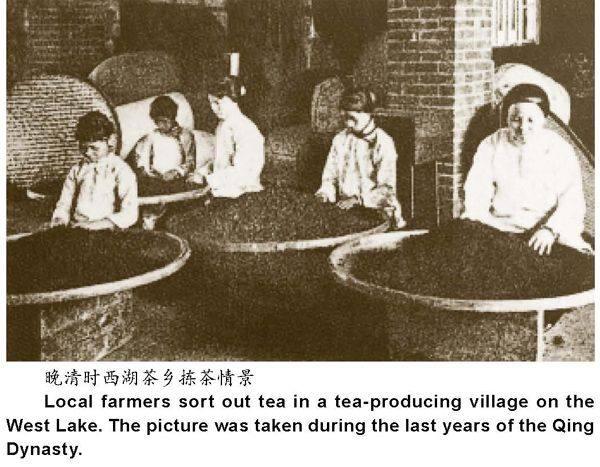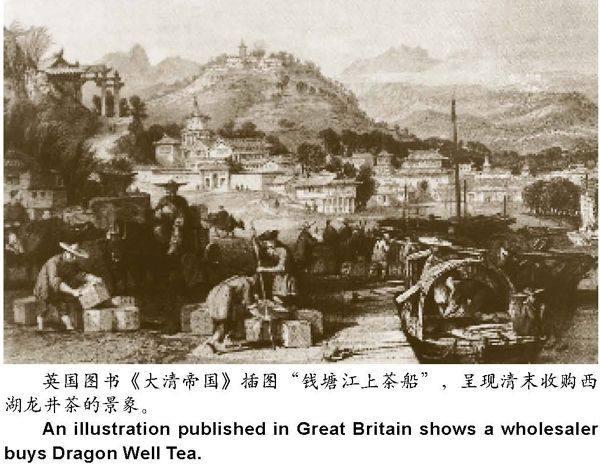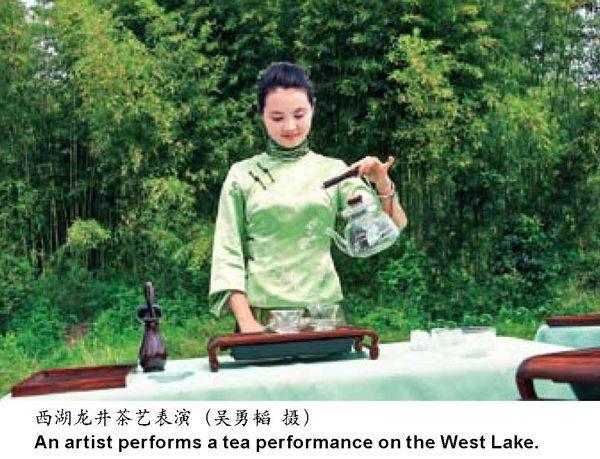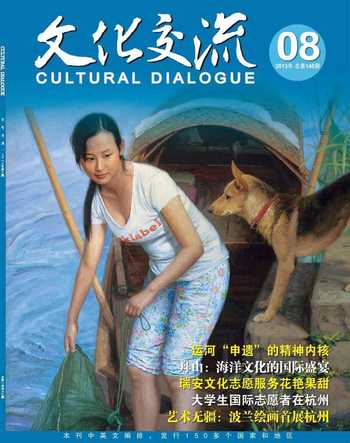法勒與龍井茶及其他
鮑志成



在20世紀(jì)70年代初打開中美關(guān)系大門的過程中,杭州龍井茶扮演了“國(guó)禮”角色,發(fā)揮獨(dú)特作用。1971年7月9日,基辛格訪華,周恩來(lái)與他在北京釣魚臺(tái)國(guó)賓館舉行首次會(huì)談。基辛格對(duì)翠芽漂蕩、香氣升騰的極品龍井茶表現(xiàn)出極大的興趣。會(huì)談結(jié)束后,周恩來(lái)囑咐工作人員送一些龍井茶到基辛格的房間。基辛格啟程回國(guó)前,周恩來(lái)到釣魚臺(tái)國(guó)賓館為他送行,并特意贈(zèng)送1公斤特級(jí)龍井茶,基辛格非常感謝。在飛機(jī)上,基辛格拿出龍井茶仔細(xì)觀賞,同行的隨從紛紛圍上來(lái),分享去一半。回到華盛頓,基辛格第一時(shí)間去白宮向尼克松總統(tǒng)匯報(bào)中國(guó)之行的情況,把剩下的半包龍井茶作為最珍貴的禮物送給了尼克松。同年10月22日,基辛格再次來(lái)華訪問,他見到周恩來(lái)時(shí),開口就把機(jī)上分茶的事說了,表示希望能再次得到龍井茶。周恩來(lái)欣然滿足了基辛格的要求,饋贈(zèng)他4公斤龍井茶。有鑒于上次的教訓(xùn),基辛格這次派外交信使用特級(jí)機(jī)密郵件將茶送回美國(guó)。次年2月,尼克松訪華,在中南海會(huì)晤時(shí)、在釣魚臺(tái)談判時(shí)、在杭州西湖國(guó)賓館的八角亭談判《中美聯(lián)合公報(bào)》(即《上海公報(bào)》)時(shí),周恩來(lái)都用龍井茶招待美國(guó)客人。2月25日,周恩來(lái)陪同尼克松一行到樓外樓品嘗龍井蝦仁等特色菜肴。離杭時(shí),周恩來(lái)也把龍井茶作為國(guó)禮送給尼克松。一些美方隨行人員還特意到當(dāng)時(shí)杭州最大的解放路百貨商店去購(gòu)買了聽裝的特級(jí)西湖龍井茶。
然而,殊不知早在120年前,西湖龍井茶就在美國(guó)試種并初獲成功。中國(guó)茶葉最初是在300多年前從荷蘭再傳到美國(guó)波士頓的武夷茶。1773年12月16日,波士頓爆發(fā)茶葉事件,揭開了獨(dú)立戰(zhàn)爭(zhēng)的序幕,3年后美國(guó)建國(guó)。1800年前后,法國(guó)植物學(xué)家安德爾·米歇爾開始在美國(guó)試種茶葉,成為美國(guó)種茶第一人。1853年后,美國(guó)專利局及后來(lái)的農(nóng)業(yè)部開始從中國(guó)引種茶葉。1859年,美國(guó)政府派遣園藝家羅伯特·福通來(lái)中國(guó)茶區(qū)考察,學(xué)習(xí)生產(chǎn)技術(shù),收集茶籽,分種美國(guó)南方各州。1880年,美國(guó)農(nóng)業(yè)部派約翰·捷克松兄弟在南卡羅來(lái)納州試種茶葉,建立國(guó)家茶葉試驗(yàn)場(chǎng),引種中國(guó)、日本、印度茶樹成功,并首次生產(chǎn)茶葉制成品,開始出售。這些試種生產(chǎn)的茶葉中,就有美國(guó)駐寧波領(lǐng)事約翰·法勒引種的西湖龍井茶。美國(guó)試種茶葉前后近一個(gè)世紀(jì),但在1915年后又告中斷,一直未獲成功,地理氣候因素或許是導(dǎo)致美國(guó)屢次引種茶葉失敗的主要原因。
約翰·法勒(1858-1923),美國(guó)馬薩諸塞州人。他在華擔(dān)任領(lǐng)事期間,積極從事經(jīng)濟(jì)、政治和社會(huì)活動(dòng)。在寧波領(lǐng)事任上,法勒曾覓得西湖龍井茶籽傳入美國(guó)。這件事在他的外交檔案里并無(wú)記載,而是光緒三十二年(1906)《東方雜志》第三卷第十一號(hào)刊登的《美國(guó)茶業(yè)情形》一文中提及的:“一千八百九十二年,駐寧波美領(lǐng)事曾覓得杭州龍井茶子回國(guó),于各省試種,惟南卡路來(lái)那著有成效。據(jù)農(nóng)部言,近年以官地五十英畝試辦,歲收茶葉一萬(wàn)磅,每磅工值貴至二十七仙半,而工人仍不趨于采制之業(yè),未易招傭云。”這篇《美國(guó)茶業(yè)情形》沒具作者,刊載在該期的“商務(wù)”欄目。文章介紹了美國(guó)各地民眾飲茶偏好和華茶進(jìn)口行銷情況,并就近年日本、印度、錫蘭等國(guó)茶“擠占”華茶市場(chǎng)份額現(xiàn)象及其原因作了分析。1892年即清光緒十八年,迄今整整兩甲子了。法勒當(dāng)年是如何覓得西湖龍井茶籽的,詳情不得而知,但他之所以這么做,肯定是出于對(duì)西湖龍井茶的喜愛和經(jīng)濟(jì)價(jià)值的考量。而文章所介紹的龍井茶籽在美國(guó)“于各省試種”看,當(dāng)年他采集的茶籽為數(shù)絕非少量,至于“惟南卡路來(lái)那(今譯南卡羅來(lái)納州)著有成效”,恐怕是與龍井茶種植的自然環(huán)境如緯度、氣溫、光照、土壤有關(guān),還與人工栽培技術(shù)有關(guān)。從1892年法勒傳入試種,到20世紀(jì)初美國(guó)政府農(nóng)業(yè)部用50英畝國(guó)有土地試辦茶場(chǎng),前后不過10來(lái)年時(shí)間,而試辦國(guó)家茶場(chǎng)后,每年的龍井茶茶葉產(chǎn)量就達(dá)1萬(wàn)磅,其規(guī)模也屬可觀。
法勒離任寧波領(lǐng)事后,繼續(xù)在華外交生涯。清末民初中國(guó)社會(huì)從封建帝制走向共和政制的歷史性巨變過程,法勒參與了一些歷史事變。辛亥革命爆發(fā),他曾介入國(guó)民革命軍的軍政活動(dòng)。描繪辛亥革命后軍閥群起的歷史小說《辛亥大軍閥》在第一卷第一百八十三章《杭州晚宴》中說:國(guó)民軍將領(lǐng)陳敬云第一次來(lái)杭州時(shí),和一群國(guó)民軍高級(jí)將領(lǐng)從福州乘坐美國(guó)巡洋艦“安吉麗娜”號(hào)到達(dá)碼頭,當(dāng)時(shí)隨行而至的美國(guó)駐福州領(lǐng)事法勒為了避嫌并沒有一同下船,而是稍候了一會(huì)。小說記敘說:“現(xiàn)在的法勒基本上已經(jīng)變成了美國(guó)和陳敬云聯(lián)系的傳聲筒,基于陳敬云的重要性和法勒在福州的出色工作,據(jù)聞美國(guó)方面已經(jīng)有意讓他擔(dān)任下一任的美國(guó)駐華公使。”這足見,法勒在華任領(lǐng)事期間十分活躍。
隨著法勒對(duì)中國(guó)國(guó)情了解的加深,他站在西方或美國(guó)利益的立場(chǎng)上,也對(duì)中國(guó)社會(huì)和中國(guó)人提出了一些鞭辟入里的看法。美國(guó)學(xué)者阿瑟·賈德森·布朗在其所著《辛亥革命》一書中,在談到中國(guó)人的信仰時(shí),引用了法勒的觀點(diǎn)。布朗寫道:“我十分贊同美國(guó)駐煙臺(tái)領(lǐng)事約翰·法勒先生的觀點(diǎn)。他說,一個(gè)誠(chéng)心膜拜神像的中國(guó)人比一個(gè)什么都不相信的白人更容易相處,也更容易使之皈依,因?yàn)檎\(chéng)心拜佛的中國(guó)人至少對(duì)自己相信的事物倍加珍惜,后者雖然見多識(shí)廣,但是對(duì)任何信仰全都毫不理會(huì)。世界上最沒有希望的人就是明知真理卻拒絕在自己的生活中貫徹真理的人。幾乎所有的中國(guó)人都是有膜拜對(duì)象的,不是孔圣人,就是佛祖。”100多年前的一個(gè)外國(guó)人對(duì)中國(guó)人的理解,即便在今天也仍然有一定的參照價(jià)值和警示意義,值得我們深思。
(除署名外,本文圖片由作者提供)
American Consul in Ningbo and Dragon Well Tea in America
By Bao Zhicheng
In 1971, Dragon Well Tea of Hangzhou served as state gift presented twice to Dr. Kissinger, then national security adviser. He expressed great interest in the Dragon Well Tea of Hangzhou at the first meeting with Premier Zhou Enlai held on July 9, 1971 at Diaoyutai State Guesthouse. Later, Zhou Enlai came to the guesthouse to see him off and presented him with a kilo of Dragon Well Tea before the adviser returned to America. While on the jet plane back to the United States, his colleagues shared some of the gift tea. The adviser later presented the remaining tea as gift to President Nixon. During his next visit to China in October, Kissinger told Premier Zhou about the tea and asked if he could get some more of Dragon Well Tea. Premier Zhou gave him four kilograms of the famous tea made in Hangzhou. This time, Kissinger took no chance. He sent it directly back to the states by diplomatic mail service.
During negotiations in Beijing and Hangzhou, Premier Zhou entertained American guests with Dragon Well Tea.
When President Nixon came to have dinner at Louwailou Restaurant on the West Lake on February 25, 1972 during his visit to Hangzhou, one of the dishes was Shrimp Stir-fried with Dragon Well Tea, a representative dish of the Hangzhou cuisine. Zhou presented Dragon Well Tea as state gift to Nixon before Nixon left Hangzhou.
The early 1970s was not the first time that Dragon Well Tea was introduced to Americans. Dragon Well Tea of the West Lake was introduced to America by John Fowler (1858-1923) during his 1890-1896 six-year-tenure as American Consul in Ningbo, one of the Chinese port cities open to international trade after the Opium War (1840-1842).
The introduction was not mentioned in his diplomatic reports. An American magazine published in 1906 mentioned that the American Consul in Ningbo got tea seeds of Dragon Well Tea of Hangzhou in 1892 and dispatched the seeds back home for experimental cultivation in various states in the United States. According to the report, the experiment was successful only in South Carolina. The magazine article reported that the Department of Agriculture allotted a plot of 50 acres for the tea cultivating experiment in South Carolina. The annual harvest amounted to 10,000 pounds in the early 20th century. As the average cost amounted to 27.5 cents a pound, it was not easy to attract business people and hire tea farmers and the commercial undertaking failed dismally. Judging from the report that the Dragon Well Tea was tried out in various states, the seeds from Hangzhou must have been in a large quantity.
The article did not carry the name of the author. It was published in the column under the title of business. The article presented an analysis of American consumers preference for various tea brands and sales of imported Chinese tea. The article also looked into the market competition from imported tea of Japan, India and Ceylon and came up with an analysis.
The report of the American magazine established the fact that more than 120 years ago Fowler acquired tea seeds from Dragon Well of West Lake in Hangzhou. Although no information reveals how he came into possession of the seeds, it would not be very difficult to guess that largely there were two ways: either he visited Dragon Well in Hangzhou to get tea seeds or he commissioned someone else to get the seeds on his behalf. Anyway, he must have got to know the value and reputation of Dragon Well Tea of Hangzhou before he managed to get the seeds and ship them back to the United States. Production in South Carolina must have boomed because the annual output of 10,000 pounds must have come from a much bigger expansion from the initial 50 acres.
John Fowler worked as a U.S. diplomat in China for many years. On and off in a period of more than 20 years, he was U.S. consul in Ningbo, Foochow (the present-day Fuzhou, capital city of Fujian Province), Chefoo (todays Yantai, a port city in Shandong Province).

